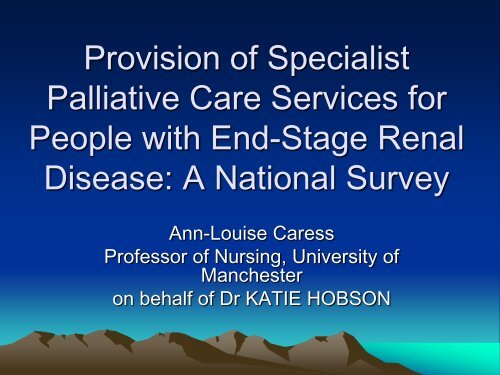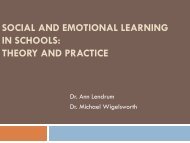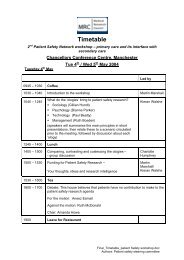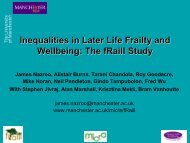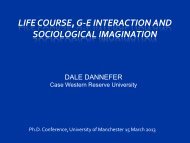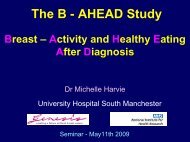Provision of Specialist Palliative Care Services for People with End ...
Provision of Specialist Palliative Care Services for People with End ...
Provision of Specialist Palliative Care Services for People with End ...
Create successful ePaper yourself
Turn your PDF publications into a flip-book with our unique Google optimized e-Paper software.
<strong>Provision</strong> <strong>of</strong> <strong>Specialist</strong><strong>Palliative</strong> <strong>Care</strong> <strong>Services</strong> <strong>for</strong><strong>People</strong> <strong>with</strong> <strong>End</strong>-Stage RenalDisease: A National SurveyAnn-Louise <strong>Care</strong>ssPr<strong>of</strong>essor <strong>of</strong> Nursing, University <strong>of</strong>Manchesteron behalf <strong>of</strong> Dr KATIE HOBSON
Project Team• Katie Hobson, SpR in <strong>Specialist</strong> <strong>Palliative</strong><strong>Care</strong>• Stephanie Gomm, Consultant in <strong>Specialist</strong><strong>Palliative</strong> <strong>Care</strong>• Fliss Murtagh, Clinical Senior Lecturer in<strong>Specialist</strong> <strong>Palliative</strong> <strong>Care</strong>• Ann <strong>Care</strong>ss, Pr<strong>of</strong>essor <strong>of</strong> Nursing
Background• <strong>End</strong>-stage renal disease (ESRD) is highlyprevalent and increasingly common• <strong>People</strong> <strong>with</strong> ESRD experience a symptomburden comparable <strong>with</strong> those <strong>with</strong>advanced cancer• Previous evidence found low levels <strong>of</strong>access to/provision <strong>of</strong> specialist palliativecare (SPC) <strong>for</strong> people <strong>with</strong> ESRD
AimTo assess current provision <strong>of</strong>, andaccess to, SPC services <strong>for</strong>adult patients <strong>with</strong> ESRD in the UK
Methods• Questionnaire survey (2008)• Study-specific questionnaire (closed andopen questions)• All UK adult hospital, hospice andcommunity SPC services (N=611) invited• Descriptive analysis <strong>of</strong> data from closedquestions and thematic analysis <strong>of</strong> datafrom open questions
Main Findings• 318/611 (52%) questionnaires returned,representing 360 services (59%)• 96% (N=306) agreed SPC has a role in care <strong>of</strong>people <strong>with</strong> ESRD• 88% (N=281) accepted referrals <strong>of</strong> people <strong>with</strong>ESRD• However, most (72%) only accepted 1-5referrals per year• Only 7% (N=23) had ESRD-specific referralcriteria• Only 17% (N=53) had ESRD-specific treatmentguidelines or care pathways
Perceived Barriers to Access/<strong>Provision</strong>• Lack <strong>of</strong> referrals• <strong>Provision</strong> available from other services• Skills/expertise <strong>of</strong> SPC teams• Organisational issues (finance,bed availability, current referral criteria)
Suggestions <strong>for</strong> Improvement• Increased staff/finance• Mutual education• Collaborative working• Development <strong>of</strong> guidelines/pathways
Conclusions• Some improvements in access andprovision since earlier surveys• However, people <strong>with</strong> ESRD still underserved• Lack <strong>of</strong> referrals is a significant issue• Improved collaboration and education areneeded
Why This Topic?• KH working in SPC and had an interest inSPC non-malignant disease• SG had an interest in ESRD• Comparable work done/in progress inother non-malignant conditions• Prior work in ESRD pre-dated someimportant developments in ESRD andSPC
Why This Study Design?• SpR project (6 months)• Feasibility – what’s worked be<strong>for</strong>e?• Resources• Ethics and governance requirements• Own skills• Prior research
Some Reviewers’ Comments‘More data on the general place andmodality <strong>of</strong> death in the region should beprovided, to give the reader an idea howend <strong>of</strong> life decisions/organisation isactually handled, and how the "nephrologyside" is looking at the problem. Ideally, thesurvey should also be sent to nephrologyunits to get their opinion on the matter’
Some Reviewers’ Comments‘The patient preferences are not analysednor discussed…[a] summary <strong>of</strong> theliterature on the view <strong>of</strong> ESRD patients onhow their end <strong>of</strong> life should be organised,should be added to the discussion’
ReferenceHobson K, Gomm S, Murtagh F, <strong>Care</strong>ssA-L (2010) National survey <strong>of</strong> the currentprovision <strong>of</strong> specialist palliative careservices <strong>for</strong> patients <strong>with</strong> end-stage renaldisease Nephrology DialysisTransplantation doi: 10.1093/ndt/gfq530


